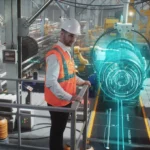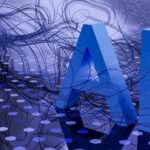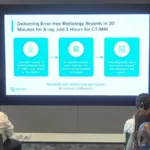The brilliance of Artificial Intelligence (AI), a multi-discipline enabling cutting-edge technology, and its meeting with education and business calls for attention. AI remains a superior player and dominant force in these realms, transforming the possibilities with traditional approaches while opening up new options for individualized learning, streamlined processes, and improved efficiency. The progress to-date in machine learning and data analytics allows AI to create the path to a future where teaching opens the door to more tailored options for each student’s needs as businesses operate more seamlessly than afore possible. This article will explore the import of AI in education and business, as well as look into its potential to transform these fields. We will also attend to concerns surrounding its implementation, and deal with ethical considerations as we progress.

Artificial Intelligence (AI) offers a green light pass to improve various industries, and its impact on education will be no exception. The customized tutoring and assessment capabilities of AI has and will greatly enhance the potential of the learning and teaching experiences within both domains.
AI continues to lead the way in education with its ability to provide personalized tutoring. Traditional classrooms are often challenged with catering to individual student needs due to time and other constraints. Whereas, AI-powered virtual assistants simply fit in with each student’s peculiar learning style and pace, offering custom guidance that improves better understanding and information retention.
On top of that, AI can assist teachers in the assessment of students’ progress in more efficient ways. Through the analysis of large amounts of continuous assessment data from in-class quizzes, take-home assignments, and tests, AI algorithms assist in the discovery of patterns that suggest areas where students may be having challenges or excelling. This information allows educators to better focus their teaching efforts on those specific areas requiring attention or offer additional tests for strengthening advanced learners.
Besides, incorporating AI into educational platforms offers interactive learning experiences. Virtual assistants embedded with natural language processing capabilities engage in intelligent conversations with students, mapping the voice of each participant and answering each question promptly or offering guidance through a detailed approach. This promotes a dynamic learning atmosphere where students feel supported all through their academic journey.
Despite these benefits, there are concerns surrounding the ethical implications that arise with the implementation of AI in the academic settings. Privacy issues linked with student data collection need to be carefully addressed to ensure non-violation as a result of data security and protection against misuse.
To wrap this up, the infusion of AI into the educational space holds a plethora of potential for improving learning outcomes by offering carefully tailored tutoring solutions, streamlining continuous assessment processes, and fostering interactive learning experiences between virtual assistants and students.
As we proceed with the possibilities of AI in the academia, it is important that we approach this technology ethically to protect privacy rights and maintain human involvement as an essential subset within the educational ecosystem.
Aside from our schools, AI has continued to push through within the business operation domain, streamlining processes, and improving efficiency. By leveraging AI technologies, organizations are able to automate repetitive tasks, make swift analysis and data-driven decisions, and deliberately improve overall productivity.

AI has made notable contributions to customer service. Virtual assistants managed by AI models have become readily available in today’s business landscape. These intelligent chatbots can handle customer inquiries promptly and accurately while delivering personalized assistance on a 24/7 basis.
Also, organizations can leverage AI-driven technologies for personalized marketing strategies that focus on specific customer preferences based on past behaviors or demographic information. This level of customization promotes higher engagement rates while saving time by eliminating irrelevant content.
Furthermore, AI-powered analytics tools help businesses to extract valuable insights through spotted patterns from vast amounts of data swiftly. This lets organizations identify trends, predict market demands from historic buying behavioral patterns, and develop targeted marketing strategies to stay ahead of the competition.
Also, AI plays a fundamental role in corporate training programs. With personalized tutoring systems delivered through AI algorithms, employees can be tutored through training tailored to their individual needs. This enhances their skill development while increasing two-way engagement and knowledge retention.
Moreover, AI-enabled work assessment tools, if well implemented, offer objective evaluations of employee performance without bias or subjectivity. These assessments help identify areas needing improvement and facilitate continuous learning within each organization.
While concerns continue to loom about massive job displacement due to automation brought by AI technology adoption in businesses; we must realize that it also brings along opportunities for employees to focus on more creative, original, and strategic tasks that require human ingenuity (bringing about a more intelligent society).
As we move forward into the future of organizational operations with increasing integration of AI technologies; leadership must carefully look into the ethical implications surrounding its use. It is necessary for businesses to prioritize transparency, privacy protection measures, as well as fairness when developing and deploying AI systems within their operations.
In summary, Artificial Intelligence works well with how businesses operate by streamlining processes through automation while simultaneously enhancing efficiency through individualized tutoring systems for employee development purposes.
AI has undoubtedly improved various aspects of our lives, including education and business. However, with any new technology comes concerns and skepticism. It is important to address these areas that bother us to ensure the responsible and ethical use of AI.
The chief concern of AI in education is the fear that it will replace teachers. While AI can enhance teaching and learning experiences, it cannot completely replace human educators who provide guidance, support, and emotional connection to students.

Another concern is privacy and data security. With the collection of vast amounts of data for individualized tutoring or assessment purposes, there is a need for clear policies on how this data will be stored, protected, and used responsibly.
Ethical considerations also surface when it comes to using AI in corporate training. There may be concerns about biased algorithms or potential job displacement due to automation. It is important to ensure fairness and transparency in model development as well as offering retraining opportunities for employees affected by automation.
Furthermore, there are worries surrounding the lack of regulation around AI technologies. As rapid advancements continue to take place, policymakers need to continue to establish guidelines that protect individuals’ rights while extending the frontiers of innovation.
To alleviate these concerns posed by AI’s impact on education and business sectors alike requires deliberate collaboration between educators in the academia, government policymakers, and industry leaders. The eventual success of integrating AI into these fields depends on proactive engagement with stakeholders while prioritizing ethics, safety, and inclusivity.
As we look ahead, there is no doubt that AI will handle more areas while improving those it is currently handling in both education and business domains. The potential for AI to create new versions of these sectors is massive, with personalized tutoring, continuous assessment, virtual assistants, and corporate training being just a few areas that AI can make a profound impact.
In conclusion, AI has proven to be a game-changer, revolutionizing the way we learn and teach, as well as streamlining processes and enhancing efficiency in various industries. In education, AI-powered tools such as personalized tutoring and assessment platforms have the potential to transform the learning experience for students. By tailoring content to individual needs and providing targeted feedback, these tools can help students reach their full potential. Virtual assistants powered by AI also offer on-demand support, answering questions and assisting with assignments anytime, anywhere.
Similarly, in the business world, AI plays very important roles in driving productivity and innovation. From automating repetitive tasks to analyzing vast amounts of data for insights that drive decision-making, businesses leverage AI technology to stay ahead in today’s competitive landscape. Corporate training programs are also benefiting from AI by offering personalized learning experiences that cater to employees’ specific needs.
While there may be concerns about job displacement or privacy issues associated with AI implementation, it is essential to address these concerns through proper regulation and ethical considerations. Striking a balance between technological advancement and human intervention is key to ensuring that AI serves us while upholding our values.
Looking ahead into the future of education and business, it is clear that artificial intelligence will continue to play an increasingly notable role. As technology advances even further, we can expect more sophisticated applications of AI across various sectors. With good learning and continued tweaking, there is almost no limit to improvement possibilities.
We must embrace this new era driven by intelligent machines as it becomes very important for us all (educators, business leaders, and policymakers alike) to work as team towards harnessing the power of artificial intelligence responsibly.
By doing so, we can unlock its full potential while ensuring ethical considerations are at the forefront of its development and application. With careful planning, AI has immense potential to create positive change, improve lives, build up connected intelligence, and shape a better future for all.
BY: Olufemi Ariyo















